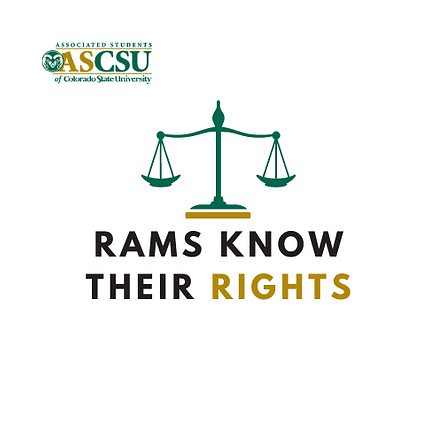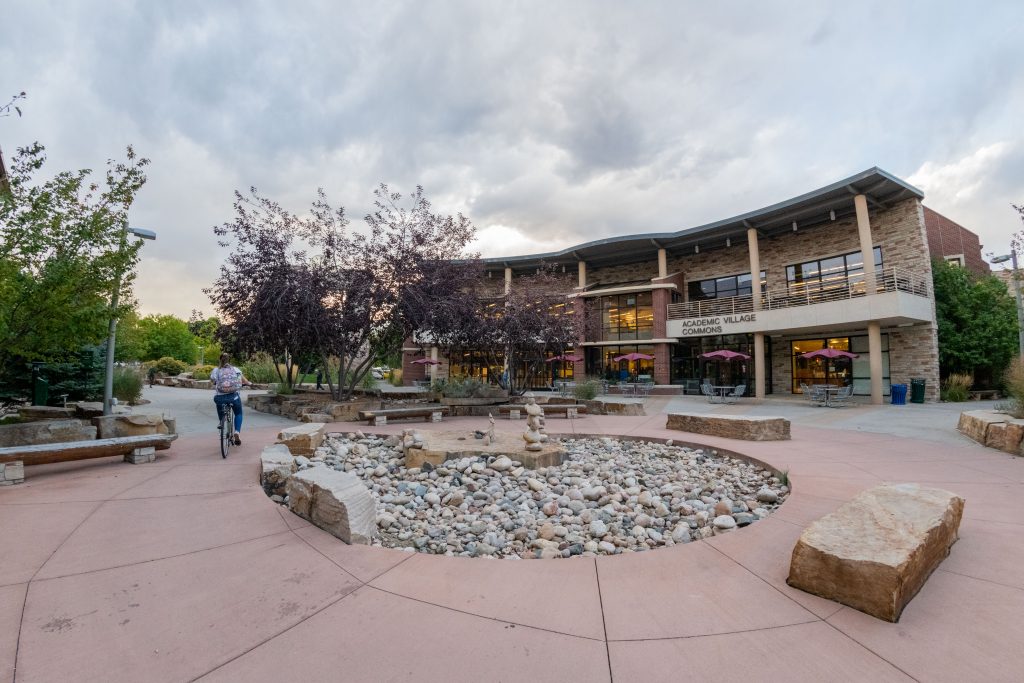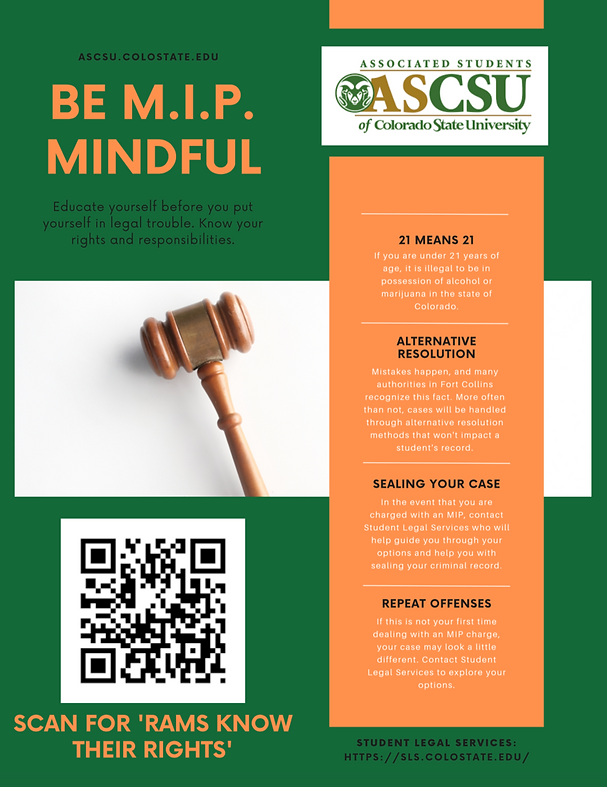Rams Know Their Rights
Rams Know Their Rights is an initiative started by the ASCSU Judicial branch. The aim of the program is to inform students at Colorado State University of their legal rights and resources related to legal problems or questions.

Dorm Rights
The 4th Amendment of the United States Constitution qualifies student housing, such as dorms, as your home. That means that you have certain legal protections while living on campus.
- You have the right to keep your dorm room door closed unless a warrant is presented by authorities.
- You have the right to ask authorities to announce themselves before you open your door for them to enter.
- You have the right to remain silent.
Failure to comply with the verbal or written directions of any law enforcement officers acting in the performance of their duties and the scope of their employment is a university violation according to the CSU Student Conduct Code.
This means that you can be referred to the University for non- compliance for not opening your door for the police, even if they may not have a warrant.
This does not mean that you should waive your legal rights, but you should be aware of University policies.

Responsible Action Exemption
The University has adopted a Responsible Action Exemption policy for students seeking medical assistance for themselves or others for emergency situations that result from alcohol and other drug abuse.
- Students or organizations, both on and off campus, who seek medical attention for themselves or on behalf of another student related to the use of drugs or alcohol will not be charged with violations of the Student Conduct Code related to that incident, provided that the student completes an assessment and any recommended treatment by the Hearing Officer.
- If a student is under 21 years of age, parents may be notified.
- A student organization must also cooperate with University officials and provide training or educational programs for its members as required by the Hearing Officer.
The University reserves the right to adjudicate any case in which the violations are egregious. Students in need of medical assistance can only receive one (1) exemption, regardless of who calls for assistance.
If a student/organization believes they qualify for a responsible action exemption, the following steps must be completed:
- The student/organization must make initial contact with the appropriate resource (i.e. law enforcement, medical personnel or University staff) as a result of their actively seeking out medical assistance for themselves or on behalf of another individual.
- The student/organization seeking assistance for an intoxicated student must give their name to law enforcement or staff, remain on scene, and cooperate with medical personnel, law enforcement, or University staff.
- The student/organization seeking an exemption must meet with Student Conduct Services staff and complete an assessment, educational program, or any additional treatment requirements of the Hearing Officer. Verification of completion must be provided to the Student Conduct Services.

Know Your Tenant Rights
Landlord & Tenant Issues Explained:
Leasing:
Read your lease! A lease not only protects the landlord, but it protects you as well. You are allowed to negotiate the terms of your lease; make sure that both the responsibilities of the tenant to the landlord AND the responsibilities of the landlord to the tenant are clearly defined and mutually beneficial. A one-sided lease isn’t fair or safe, especially for students who have limited capital. Bring your lease into Student Legal Services if you have any questions or need assistance negotiating.
Security Deposits:
Landlords are required to return your deposit in full, with accounting, 30-60 days after you vacate if the tenant has not violated any terms of lease. A landlord is not allowed to use or withhold the security deposit for “normal wear and tear” that occurs as a result of a person or persons occupying a property.
Repairs:
Understand what the landlord is responsible for maintaining. Read your lease carefully to understand what maintenance is included in your lease and if you feel like a landlord isn’t holding up their maintenance responsibilities, bring your lease into Student Legal Services to evaluate your options. Documentation is key, so take pictures of damage to cover yourself and to provide evidence in the event a dispute arises.
Obligation of the Landlord to Maintain Habitable Premises:
Under a Colorado law applying to all residential agreements entered into or renewed as of September 1, 2008 (C.R.S. §§38-12-501), a landlord, by virtue of renting a property, warrants that the premises are fit for human habitation and for the uses reasonably intended by the parties.
A tenant may withhold rent from a landlord if, and only if, three conditions are met:
1. The tenant finds that the rental unit is unfit for the uses reasonably intended by the landlord and tenant, and
2. The rental unit contains a condition that is materially dangerous or hazardous to the tenant’s life, health or safety, and
3. The landlord has received written notice of the condition and has failed to correct it
When your Landlord can Enter the Property:
If a lease does not include a written clause specifying when the landlord can enter the rental property, you have exclusive use of the property. However, if a tenant refuses to allow the landlord entry, the tenant assumes all liability for damages and repairs to the rental unit, as well as consequential damage to other units. Reasonable notice by the landlord for access to the rental property should be addressed in the lease. A commonly used privacy clause allows a landlord access to the rental property at reasonable times and with reasonable notice to the tenant to make necessary repairs or reasonable inspections. Additionally, a landlord has the right to enter a rental unit without notice in emergencies. Review your lease carefully to fully understand your rights to privacy at your rental property.
Joint and Several Liability:
Most leases create “joint and several liability” between co-tenants, meaning that when more than one tenant signs a lease, each tenant is individually responsible for all of the conditions and responsibilities of the lease. For example, a landlord can demand the entire rent amount from any one tenant if that tenant’s roommate moves out without paying rent. Read your lease carefully and make sure all your co-tenants or roommates understand this responsibility.
Off-Campus Living:
Something else to keep in mind if you’re considering popular off-campus student living is to understand that they use a lot of marketing tactics designed to pressure you into signing a lease as soon as possible. Do not get pressured into signing a lease! Please take your time to review the lease and enlist the help of student legal services if need any other assistance.
Terminating your Lease:
If you’re thinking about terminating your lease, there are a lot of legal factors to take into place. This is NOT a decision that a student should be making on their own. Please consult Student Legal Services to understand if your situation has legal basis to terminate your lease. Refer to this link for quick notes and explanations:
https://sls.colostate.edu/wp-content/uploads/sites/25/2020/11/THINKING-OF-BREAKING-YOUR-LEASE.pdf
